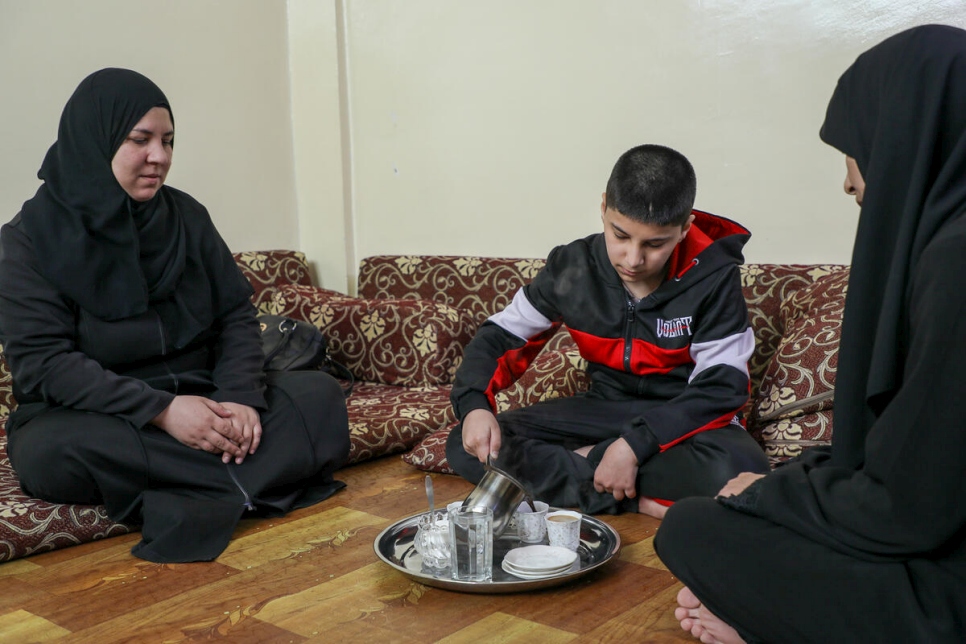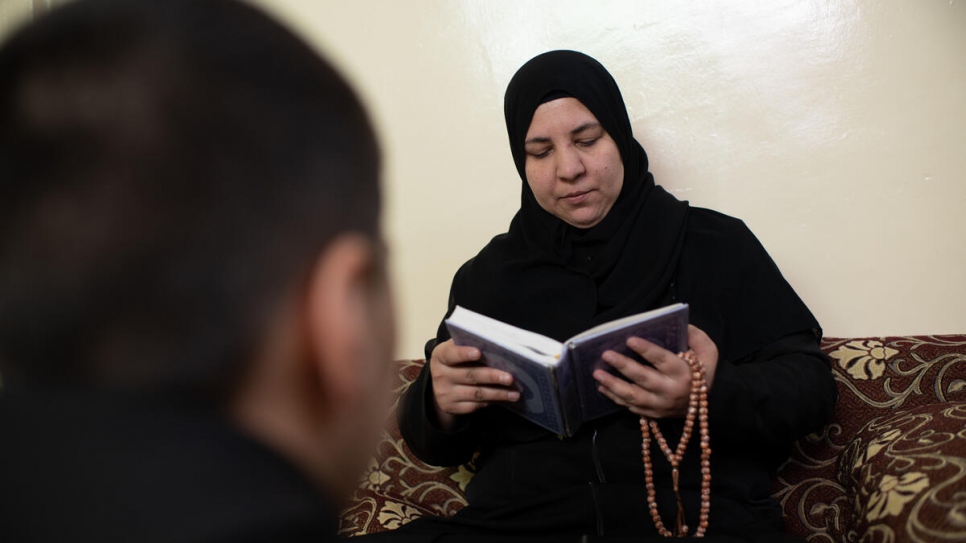As the Holy Month approaches, launch of UNHCR’s Ramadan fundraising campaign promises desperately needed financial support to refugees struggling during COVID-19.
From UN Refugee Agency (UNHCR)

Ali, 12, pours coffee for his mother Jameela (left) and aunt Huda (right) at home in Amman, Jordan. © UNHCR/Lilly Carlisle
AMMAN, Jordan, Media www.rajawalisiber.com – Jameela has faced many struggles since fleeing bombs and fighting in her home city of Homs in 2013. After her husband was killed in Syria, she has had to bring up their four young children alone as a refugee in Jordan while struggling to pay rent and cover their basic expenses.
As a result, the peace and spiritual healing she found during the Holy Month of Ramadan was always something to look forward to, even if the large family gatherings and abundance of food that marked their nightly Iftar meals back in Syria were a distant memory.
But in recent years, even the more modest celebrations they enjoyed in Jordan have become increasingly muted affairs. Jameela relied on cash assistance from UNHCR, the UN Refugee Agency, to cover the family’s expenses. But with the number of families in desperate need of such support outstripping the available funds, three years ago her assistance was stopped.
“We had some tough months.”
Then last year came the COVID-19 pandemic, and the introduction of a strict lockdown across the Kingdom to contain the spread of the virus. Both factors combined to make last year’s Ramadan a particular struggle for Jameela and her children Ola, 14, Ali, 12, Aisha, 10, and Ahmed, 8.
“It was harder than any other Ramadan,” Jameela said. “We faced a lot of challenges…There was a lot of needs we couldn’t meet, not only when it comes to food. My kids got very bored. They couldn’t even play outdoors with the neighbours like any other year. They were fasting the whole day, and then after Iftar they can’t even go out and play.”
Added to this were concerns over her children’s education as, with schools closed due to the pandemic, Jameela struggled to keep pace with their learning needs having herself only completed grade six. Then there were the ever-present financial worries that had plagued Jameela ever since her cash assistance was cut off.
“We had some tough months. Sometimes I wasn’t able to cover the full amount of the rent, and when this happened, I used to get scared of being evicted by the owner of the house,” Jameela explained.
To cover the shortfall, she was forced to borrow money and accumulate debt, and use funds that had been meant to cover school expenses such as books and equipment for her children.
It was a massive relief, therefore, when Jameela received an SMS at the start of this year informing her that her cash assistance was being restored after the three-year hiatus.
UNHCR’s cash assistance programmes have received a welcome boost from the annual Ramadan fundraising campaign, which in recent years has allowed many more people to receive desperately-needed financial assistance. In Jordan, approximately 33,000 refugee families receive cash assistance from UNHCR every month, which is partly funded through such donations.
Since its global launch three years ago, the annual campaign has raised more than US$106 million. This has enabled UNHCR to provide lifesaving support to 3 million vulnerable refugees and internally displaced people in 13 countries through the distribution of cash assistance and goods, allowing them to address basic needs including shelter, food, education, healthcare and debt repayments.
Last year’s campaign was the most successful ever, raising over US$46.5 million. This was largely due to funds received through UNHCR’s Refugee Zakat Fund, which was launched in 2019, harnessing the power of Zakat and Sadaqah to transform the lives of refugees and internally displaced people.
The theme of this year’s campaign is “Every Second Counts”, reflecting how quickly conflict and violence can upend the lives of people, forcing them to flee their homes, and how a moment of generosity can ease the burden on struggling families. Donations received will also help meet the mounting needs caused by the COVID-19 pandemic.
Despite ongoing curfews and the negative socio-economic effect of the pandemic on both refugees and Jordanians, for Jameela, the resumption of her cash assistance has lifted a heavy financial and psychological burden. As the Holy Month approaches, this Ramadan she is looking forward to cooking good food and focusing on the future.
“I hope this Ramadan will be better than the last one… All I wish is that God leaves me in good health and safety, and for my children to have a beautiful future.”
Zakat and Sadqah donations to people in urgent need can be given now via zakat.unhcr.org and UNHCR’s newly launched Zakat mobile application “GiveZakat”.

